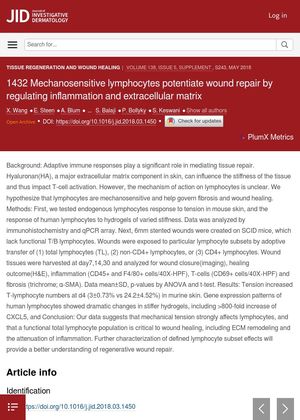Mechanosensitive Lymphocytes Potentiate Wound Repair by Regulating Inflammation and Extracellular Matrix
April 2018
in “
Journal of Investigative Dermatology
”

TLDR Lymphocytes, a type of immune cell, are crucial for wound healing as they help remodel damaged areas and reduce inflammation.
The study "Mechanosensitive lymphocytes potentiate wound repair by regulating inflammation and extracellular matrix" from April 30, 2018, investigated the role of lymphocytes in wound healing and fibrosis. The researchers hypothesized that lymphocytes, which are sensitive to mechanical tension, play a significant role in these processes. They tested the response of endogenous lymphocytes to tension in mouse skin and human lymphocytes to hydrogels of varied stiffness. They also created wounds on SCID mice, which lack functional T/B lymphocytes, and exposed these wounds to different lymphocyte subsets. The results showed that mechanical tension significantly increased T-lymphocyte numbers in murine skin and dramatically changed gene expression patterns of human lymphocytes in stiffer hydrogels. The study concluded that a functional total lymphocyte population is critical to wound healing, including extracellular matrix remodeling and the attenuation of inflammation.



